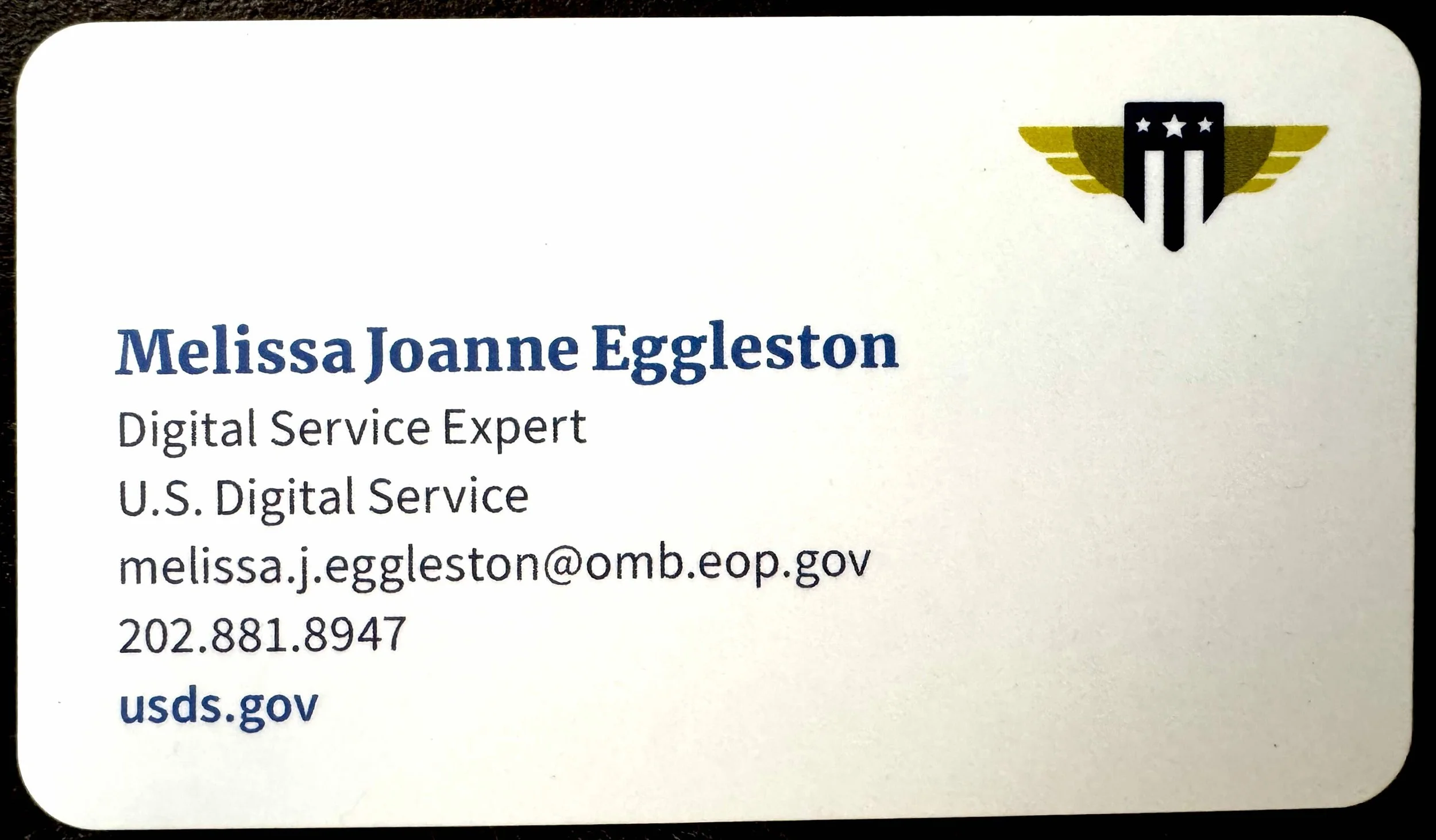Here are the common questions I receive from those interested in user experience (UX). I love my work, and I hope my experience can help someone. All opinions are my own. Please take what you like and leave the rest.
WHAT HAS YOUR JOURNEY BEEN LIKE?
Here are the general stages of my journey:
Intern at a tech startup in the 90s —> divert to 5-year career in financial planning –-—> switch to 4-year career teaching ESL––—> go to grad school and discovery visual communication/UX design –––> specialize in content strategy work ——> deeper dive into user research ——> discover interest in trauma-informed design——> start teaching at a university ——> continual learning on a variety of topics (lots of systems thinking lately!).
Someday I will make that into a visual but can’t today!
What was your TITLE at your FIRST/RECENT/WHATEVER JOB?
Here are my job titles in order over the last 15 years:
See the general title that 200+ of us held – “Digital Service Expert”
Communication Specialist
UX Specialist & Content Strategist
UX Researcher
Senior UX Designer
Director, UX Research
UX Consultant
Digital Service Expert
Principal Service Designer
Please don’t over-index or worry about titles. I’ve done tons of UX design at all of the above jobs and ones before these. I have friends who made up their own titles. I’ve had bosses who made up titles that didn’t make much sense. I, along with most of my other senior designers friend, have had to explain UX to the bosses who hired them. (Does this happen to accountants?!) We have all also cried due to the frustration at our jobs. UX design work is not for the timid. You may have to fight to do your job well. It’s annoying, but this is the reality I have experienced.
Did you know you wanted to do this in college?
Definitely no. I was a philosophy major. Would you like to talk about Aristotle? I discovered UX work while in grad school for journalism. I have never had an overall strategic career plan with a 10-year destination. I cannot even imagine having that much clarity on my career. I usually plan for the next 2 to 3 years. I ask myself when considering a job, “Can I be happy doing this for at least 1 year and maybe 2 or 3?” The reality is you never truly know what a job is like until you try it out. I find that the first 9 months of a job is just figuring out who is really in charge. For this reason I’m a big fan of internships and contract-to-hire work. I have had mentors and friends guide me along the way and point me to opportunities. I found these mentors and friends through local UX groups and work colleagues.
I trusted that following my interests would help me to be engaged and excel at my work. So far this has worked for me. Maybe it will all fall apart with AI, but I am powerless over that, so I’m not worrying about it.
I want to get into UX DESIGN, WHAT SHOULD I DO?
Figure out a way to start doing it NOW. You don’t have to go to graduate school or a bootcamp to get started. Read books on UX and/or find a UX course online. Figure out how to work UX into your current job. Start hanging out with UX professionals to learn more. Volunteer anywhere so you can learn more, even if it’s just for 2 hours a month. Look at events at your closest UXPA (User Experience Professionals Association) chapter and search places like Eventbrite and Meetup for local events. Many people start to realize that they have UX-y parts of their jobs, but they didn’t have the words or tools that designers have. I have met a number of people doing internal operation work that sounded exactly like service design. You may already be doing some UX activities and just need to stretch into doing them more. That is where I would start. Then you will have UX activities and experience to speak about in a job interview.
I work in DIGITAL COMMs/Marketing/DRIVE A TRUCK/SOMETHING ELSE NOT UX.
Really, if you have a job, you can probably sort out how to bring some UX into it. (Your manager can be your user if nobody else). This will give you fodder to talk about. Start learning more about UX. See how to transfer and apply these skills to your work OR to a passion project. For example, if you love dogs and volunteer at the animal shelter, can you learn how to run usability tests for them to uncover what needs to change about their website? Also is there any way that you can get the word UX into your title somehow in your next job review?
Should I do a bootcamp?
I have seen people get jobs this way, but it s not a requirement to get a job. In fact, I co-taught a 6-hour intoduction to UX class for Girl Develop It in 2012 and an attendee decided afterward to quit their job and join a full-time bootcamp. The other teacher and I were alarmed about this! She has now been happily working as a UX researcher for 8+ years. But getting the first job took a more than a year after the bootcamp ended. You may be able to make the transition by learning on the side in an inexpensive way, and bootcamps feel kind of 2015 at this point.
should I GO TO GRAD SCHOOL?
I am a proponent of going to a high-quality program to learn more about UX, but again it’s not a requirement to get a job. I was doing UX and getting paid good money not because of my grad school work (which for my Master’s degree was mostly usability testing). I benefitted from acquired skills from workshops, professional meet-ups, and strategically taking classes as I needed to learn more (like a great research methods class at the University of North Carolina at Chapel Hill in 2014 with Diane Kelly).
What are the characteristics of a great UX Designer?
Here are the top characteristics that come to mind.
Initiative - It’s your job to figure out problems, identify unanswered questions, and get answers by using various research methods. You probably have to design or contribute to designing the solutions. Other tech professionals typically can’t direct you well on this. You need to be able to self-start and approach ambiguous situations with a plan. Training, reading, speakign to mentors, joinign professional groups helps you learn how others have handled similar situations. If you are the kind of person who needs a manager to tell you exactly what to execute, this job may not be for you.
Curiosity - The basic requirement of a UX professional. Your probably have this if you’ve read this far. If you are naturally nosy and want to know “why,” you might be a UXer.
Assertive - You need to be comfortable with healthy conflict. Designers regularly run into conflict with product managers and engineers because each role is oriented slightly differently. If you just want to be at a computer and knock out your work, this field may not be for you. I’ve spent a lot of time communicating, educating, persuading, and pushing for better outcomes.
Others may disagree with me, and I do think that various types of people can thrive as a UX designer.
What about my portfolio?
Yes, you need one, most jobs expect you to have one. Real work for real organizations outshines student projects any day. Read Don’t Make Me Think by Steve Krug or Just Enough Research by Erika Hall and then try to apply some of the ideas to a system, app, website - perhaps a website owned by a friend or a local nonprofit who has a poor website. (Easy to find!) For example, find a website that has a carousel, get rid of it. Then give yourself a high five for making the world a better (and more accessible) place!
Do you know other people I should talk to?
I know lots of people but I’m not going to send you them. I don’t think informational interviews are a good use of anyone’s time. Even if I really like you, I can’t recommend you for a job with any authority. I don’t have firsthand knowledge of your work. I can probably send you to someone else to talk with and they will say yes as a favor to me. But they may not want to do it, and they may not see any value in it for them. Instead go to local in-person UX events or online events. There you can find others also seeking to connect and network. Find places to volunteer (like for a UX conference) so that people can really get to know you and trust you (because they get to see you in action).
If you have other questions, please contact me. I’ll add answers to this blog post over time. Thank you for your interest and care in making the world a better place through UX work!














